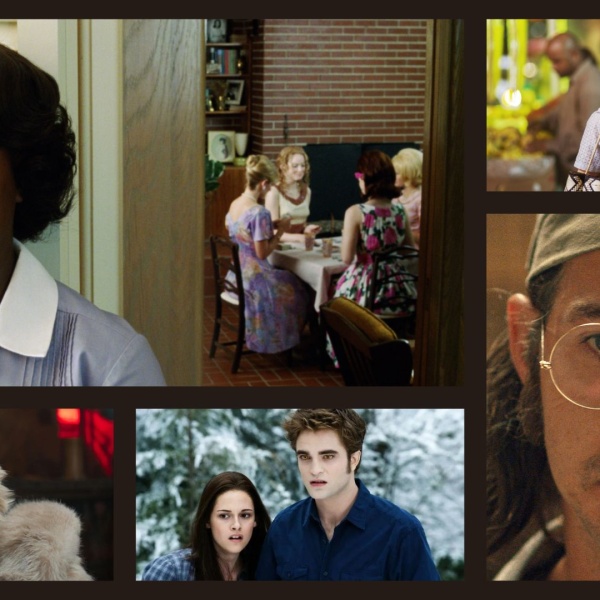A Point/Counter-Point Review Of Kenneth Lonergan’s Long-Delayed Contentious Drama

“Margaret” was a film that split those at The Playlist who saw it right down the middle with some of us hailing it as a near masterpiece, while others had some clear issues with Kenneth Lonergan‘s long-awaited, sprawling drama. So, we have two reviews for you here. The first is a positive take from Drew Taylor and the second is a more critical look by the site’s editor-in-chief.
If for some reason you had forgotten that Kenneth Lonergan‘s “Margaret” was filmed more than a half-decade ago, there are reminders everywhere. The credits cite two members of the production team (Anthony Minghella and Sydney Pollack) who have been dead for several years, and throughout the film there are details – sometimes intrusive, almost always hilarious – about how old this thing is: a child eagerly grips a GameCube controller; a movie marquee advertises Jodie Foster‘s “Flightplan“; Matt Damon, so bulky as the suburban father facing a global epidemic in this month’s “Contagion,” is looking very slim like he just came from “The Bourne Identity“; and high school children energetically debate the pros and cons of the Bush administration’s politics. Even the casting seems out-of-time: Anna Paquin, for the past four years known to America as the blonde, psychic firebrand Sookie Stackhouse on “True Blood,” here plays a raven-haired teenager.
But in a strange way, all of this adds to the very specific sensation of watching the film. “Margaret,” named after a character in Gerard Manley Hopkins‘ poem “Spring and Fall” (discussed by the high-schoolers in the film), feels freshly post-9/11, the gaping wound in New York City still raw and smoldering, and the anxieties and neuroses of an entire city very much on the surface. Often times in “Margaret” the camera will just take to scanning the skyline, glacially taking in the tall, glassy buildings, a reminder of the relative peace that was shattered one fall day.

Lonergan was previously responsible for 2000’s rambling, well-received relationship drama “You Can Count On Me,” which, among other things, was nominated for two Academy Awards and single-handedly launched the career of Mark Ruffalo. In a lot of ways, it makes sense that this was his follow-up – a far grander and more novelistic approach to the same concerns, mostly how crazy we all are. You can tell how easily this thing got away from him, with its splintered narrative and epic scope, and even in its final form — admittedly messy and occasionally baggy — it feels like a true accomplishment of American cinema and something every serious film fan should see.
The film starts off with a truly horrific accident. Lisa (Paquin), a whip-smart and casually confrontational teenager on the Upper West Side, is looking for a cowboy hat. She sees a bus driver (Ruffalo) wearing a hat and tries to flag him down. The two make eye contact, her zigzagging on the sidewalk while he steers the bus and runs a red light, fatally hitting a pedestrian. (It says something about Lonergan’s clout and talent that the victim is played, in one very memorable scene, by Alison Janney). Lisa runs to the woman’s side, who is bleeding badly and near death. It’s a moment that changes Lisa’s life and from this moment the movie fractures outward, picking up subplots and discarding them, an ever-evolving, constantly surprising tale of grief, tragedy and hope.
At home, Lisa has a contentious relationship with her mother, Joan (Lonergan’s wife, J. Smith-Cameron), who has just started a new Off-Broadway play. Joan has gotten involved with a man named Ramon (Jean Reno, hilarious and revolting), a smoothly charismatic ladies’ man. At school, Lisa’s grades are beginning to slip and she becomes more outwardly sexual, first asking a schoolmate (Kieran Culkin) to take her virginity and then aggressively coming on to one of her teachers (Damon). Lisa also recants her testimony that the bus driver was driving through a green light, teaming up with the dead woman’s best friend (Jeannie Berlin) to file a large lawsuit against the driver and the bus company.
With so much going on, the movie really hums, especially in the first hour and a half. It’s so refreshing, in an era of quick cuts and jumbled cinematography, to just linger on the inner lives of these characters. There’s an electric charge to both the performances and the way the movie is put together, hopscotching between scenes and characters in an effort, not to build tension exactly, but to create a world populated by people and their emotions. Nothing is ever easily explained – is Lisa just manipulative or genuinely damaged goods? – but that certainly doesn’t take away from the film’s singular power.
Knowing about the film’s painfully protracted editorial period (which involved a handful of helpful contributors including Martin Scorsese and was punctuated by a pair of lawsuits against the film by its producers), you begin to wonder why the things that remained in the movie were there. Sometimes it’s mysterious. There’s a “Black Swan“-like moment when Lisa has a truly ghoulish nightmare, which suggests a true psychological break following the accident. But it’s never followed-up on or mentioned. It just appears. And is then gone. You have the vague sensation that Matthew Broderick‘s high school English teacher had more to do in a longer, unrealizable version of the movie, but it’s merely a hunch. Towards the end of the movie a character blurts out, “I had an abortion!” and you’re left to wonder – was that a big deal in some other cut? – since here it exists as a breezy, shocking punch line.
In the film’s last hour, the messiness that made it so endearing becomes a detractor. There’s far too much time spent on the procedural-like minutiae of the lawsuit and there’s no payoff for a handful of characters, including Ruffalo’s bus driver. But all is forgiven by the film’s emotionally grand finale, set at an opera, which perfectly encapsulates the film’s bold mixture of high drama and inner catharsis. “Margaret” won’t endear itself to everyone (there was practically a Jets vs. Sharks face-off after our screening) but it’s certainly worth watching, even if you end up hating it. A picaresque, beautifully rendered and affecting drama, “Margaret” was worth the wait. [B+]
There’s A Good Movie Inside ‘Margaret’ Somewhere
Beware, there potentially may be spoilers within, read at your own risk.
Clocking in at an unwieldy two and a half hours, Kenneth Lonergan‘s insistently-long and long-overdue “Margaret” finally arrives in theaters this week after a protracted six-year delay. Stuck in a legal battle for over half a decade due to its exorbitant run time — Lonergan wanted a 3-hour-plus version, but was contractually obligated to deliver something no longer than two and a half — and unable to find a satisfactory edit within the time limit that he could live with, Lonergan kept fiddling with the picture until producers sued and completion bond companies stepped in to make things even uglier (that back story is a movie unto itself). And it’s easy to understand why the “You Can Count On Me” filmmaker suffered from economic and manageable completion anxiety as “Margaret” is striking and filled with strong performances, but is often implicated by its unfocused, inarticulate and self-important nature as it gazes indulgently at all its various characters and their assorted predicaments.
Over the years, Lonergan reached out to friends like Sidney Lumet, producer Scott Rudin, Sydney Pollack, Martin Scorsese and Thelma Schoonmaker for their help in suggesting cuts and/or delivering their edits of the film. The filmmaker allegedly rebuked and cast aside their suggestions. Again, it’s clear why he did — “Margaret” is Lonergan’s opus, his baby, and it’s that concern, fussiness, over-doting and enabling of its worst tendencies that’s ultimately the movie’s undoing. In fact, “Margaret” overcooked in the womb for so long it outlived two of its famous producers, Anthony Minghella and Sydney Pollack, if that gives you an indication of how belated the debut is.
An absorbing examination of guilt and morality against the backdrop of post 9/11 New York, the angry, embattled and combative “Margaret” story is told through Lisa Cohen (Anna Paquin), a still-discovering-who-she-is brambly teenager with typically ungrateful, narcissistic, rebellious and tempestuous tendencies. During a stroll through Manhattan’s Upper West Side in search of a cowboy hat needed for a horseback riding trip with her California-residing father (played by Lonergan), the teen inadvertently distracts a bus driver (Mark Ruffalo) who then runs a red light and accidentally tramples Monica Patterson, an innocent woman crossing the street (Alison Janney).
As the horrific accident takes place right before her eyes, Lisa attempts to help the bloody and traumatized woman, only to have her die in her arms. When police officers arrive on the scene of the accident, a nervous and distressed Lisa lies when asked if the bus driver ran a red light, partly because Ruffalo’s character looks at her with pleading eyes and possibly because she realizes deep down that her frivolousness is partly responsible and precipitated this tragedy.
In the wake of this incident and what unfolds in the aftermath is Lisa’s moral crisis, her humanistic awakening to guilt, and her fearful and toxic teenage response to all the fallout and decisions made along the way. Alone, forced to take this exigency on her own because her mother (J. Smith-Cameron, the director’s wife) is too involved in her own burgeoning Broadway success to pay close attention, Lisa is compelled to turn to those who will listen to her dilemma, like her understanding geometry teacher (Matt Damon). When that’s not enough she turns to boys (Kieran Culkin), drugs, boys who love her that she does not love back (John Gallagher Jr.) and the only somewhat helpful-advice of her father. She even goes as far as to confront the bus driver and his wife (Rosemarie DeWitt), but that contentious meeting goes nowhere. So, stymied, confused, generally agitated and looking for meaning in this accident, Lisa continues to try and intervene (meddle) and see if the woman killed in the accident has any kin. She stumbles on Abigail (Betsy Aidem), the cousin of Monica, who says she didn’t know her well and doesn’t want to be harassed any longer with inquiring phone calls. She puts her in touch with Emily (Jeannie Berlin), Monica’s mourning best-friend, which sets off an entire act of tentacled, involved and wandering plot.
Meanwhile, Lisa’s mother embarks on a relationship with Ramon (Jean Reno), a wealthy but kind South American businessman. While this subplot enforces that Joan has her own life, her own concerns and that she’s a three-dimensional person outside of Lisa’s querulous teenage life, as “Margaret” grows in scope, it tends to take on “Heat“-like subplots of subplots that bog the picture down and do little to add emotional amplitude or depth (another subplot is the literature class that Matthew Broderick teaches and the debate class that features actors like Olivia Thirlby and some deeply fractious arguments). Back with Emily and Lisa, trying to do the right thing, the young girl confides in the older woman that she lied about her police report, and they set out to find a lawyer who can bring the irresponsible bus driver to justice. But having already lied about the incident, Lisa is met with obstacles everywhere. The police don’t really care to hear it and even her lawyers tell her this will be a major blemish on any case they try and embark upon.
Eventually, with the assistance of Abigail, the distant cousin who now deeply cares because the deep pockets of the MTA (Manhattan Transit Authority) could yield some hefty and sizable financial rewards, Lisa, Emily and their lawyer try and seek some justice. But as the case gets deeper Lisa’s finds that her naive, youthful ideals hit upon the harsh realities, roadblocks and compromises of the adult world. Here’s your theme, as Lisa encounters nothing but opposition along the way to righting her wrong, but the case can only earn only punitive damages and the already prickly and discordant teenager (and movie) begins to turn downright shrill.
Having by now emotionally tormented her family and friends throughout the picture with her discomfiture and acrimony from the accident, whether at school or with her mother, Lisa is deeply dissatisfied with the legal outcome and begins to brutally lash out at everyone around her. Already testing patience and limits by this point (after a pretty solid first half), this is where the picture begins to truly curdle and unravel. She seduces her teacher and then half-heartedly attempts to ruin him later on, she alienates her one ally and friend in Emily and she essentially destroys almost every relationship around her in a careless fury. Why is she acting out her rage exactly? Is this a post-trauma out of control? Have the terrorists truly won? None of this is clear. It all builds up to a redemptive and absolving moment at an opera where Lisa and her mother come to terms and forgive one another. But getting to that opaque, overly-melodramatic and emotional moment is, by the end of the two and half hours, a test of wills.
A playwright by nature, part of Lonergan’s difficulties with “Margaret” is that it is brimming with prose-like ambition that becomes pretentious when it (often) misses the mark and devolves into exhortative oration. When Matthew Broderick’s English teacher lectures Shakespeare to the class, he’s a not-so-subtle Lonergan proxy lecturing to the audience. When he reads “Spring and Fall: To a Young Child” by 19th century poet Gerard Manley Hopkins aloud to his class — yes, we get it, you’re trying to hammer us with the theme of the death of innocence — it’s just too painfully obvious. When students antagonistically argue about the Taliban and the post 9/11 fallout, it feels just like manipulative, careless molotov cocktail plot devices being thrown in to the thematic mix to keep the contentious mood of the picture churning. Likewise, the ill-advised arguments about the Palestinian and Israeli crisis between students, plus Emily and Ramon, the Spanish-boyfriend, are either too-on-the-nose haranguing moments or just regressions into “strident” melodrama. Yes, these conversations are supposed to be texture to the time and place, but it doesn’t ring very true (and to be honest part of that could be because the film has arrived so long after the fact).
For such an involved story that precipitates such complex feelings about characters and their behaviors, Lonergan makes some strange misfiring moves. An argument between Lisa and Emily where the teenager suddenly becomes hyper eloquent just feels queer. The audience knows that Lisa’s teenage egomania is painfully making this accident all about herself, but Lonergan chooses to make an argument with Emily a tirade against the shortcomings and limitations of self-absorptive adolescence (adolescence being the cornerstone, beauty and evil of this picture). When Lisa becomes too melodramatic, she’s called “opera” which conveniently enough is how the film ends, with a dramatic performance of “Belle nuit, ô nuit d’amour” from Jacques Offenbach‘s opus “The Tales of Hoffmann,” which the picture has minor allusions to.
The other main problem in the picture — other than to not explain its lead character’s sometimes noxious motivations — is its dogged pursuit of capturing some kind of divinity or cinematic truthfulness in humanity. Like its petulant teenage protagonist, “Margaret” feels like a self-frustrated and irascible picture. There’s a good movie somewhere in these 2.5 hours — which obviously went though dozens of different editorial iterations — but it’s just too damn precious, kicking and screaming to get out among all these messy subplots, threads, allusions to poetry and the desperate need to fulfill themes.
There are some masterful and mournful moments and, particularly, shots in “Margaret.” The opening death sequence is harrowing stuff and kicks the movie alive after an indolent start. Anna Paquin’s character walking in slow motion down the streets of Manhattan, being harassed by young men, only further demonstrates her alienation, anger and confusion. In fact, when characters don’t talk, Lonergan is at his finest, with well-crafted elegiac moments of solemn observation. Anything that takes place on a stage is generally breathtakingly blocked. Nico Muhly‘s score is powerfully doleful, and as Lisa’s mother, J. Smith-Cameron is a revelation of exasperation and patience. But more often than not, “Margaret” collapses under the weight of its pretenses.
While the picture is without a doubt provocative and discussion/argue-inducing, it’s also no controversial Lars von Trierchef d’oeuvre that will make your blood boil yet still inspire within you pangs of empathy for its victims, pawns and players. The difference is that even von Trier’s most hateful pictures have clarity, while Lonergan’s picture fumbles around in the dark, trying to find a satisfying exit. One could arguably call it the “Do the Right Thing” of the post-9/11 disaffected privileged Caucasian youth set, as it’s often just as bold, caustic and unpleasant, forcing you to examine yourself via the melodrama you just witnessed. And while it strives for masterpiece status, “Margaret” falls far from the mark. Its somewhat vague conclusion at an opera — featuring tears of forgiveness between a mother and daughter (but “Why now?” you’ll ask yourself) — is not just simply unsatisfying, it’s downright infuriating and full-on indulgent. Like our point-counterpoint reviews suggest, this is a polarizing picture that will probably be either loathed or loved. But to this writer, the picture’s meditation on miscommunication and misunderstanding is frequently potent, but just as often an uneven, shouty diatribe masquerading as a candeza. Ultimately frustrating with a grating, off-putting and intolerable lead character that will lead some audiences to loathe her and move others to empathize with her, “Margaret” is a picture some will admire, few will love and some will detest, but that no one will be able to stop talking about. [C+] – RP



